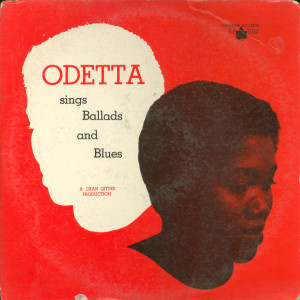 Odetta is one of the key figures in the American and worldwide folk music revival of the 1950s, and along with Pete Seeger and Ramblin’ Jack Elliott one of the few still around and performing today. This glorious re-release of her seminal 1956 album, Sings Ballads and Blues shows just how good and how relevant she was.
Odetta is one of the key figures in the American and worldwide folk music revival of the 1950s, and along with Pete Seeger and Ramblin’ Jack Elliott one of the few still around and performing today. This glorious re-release of her seminal 1956 album, Sings Ballads and Blues shows just how good and how relevant she was.
Odetta was a child prodigy with the good fortune to grow up in Los Angeles in the 1940s instead of her native Alabama. She started classical voice training at the age of 13, and a few years later was in the cast of a traveling production of the musical Finian’s Rainbow where she met the blues harpist Sonny Terry. She soon left the musical stage for the burgeoning folk scene in San Francisco, then New York, she she fell in with Seeger and Harry Belafonte, among others.
This album contains the original 16 tracks from Ballads and Blues and four bonus tracks from 1957’s At the Gate of Horn. The material ranges from deep spirituals and gospel to old ballads of European origin, from the Delta blues to Jimmie Rodgers’ country blues, from work songs to calypso. It’s all delivered in Odetta’s powerful deep alto, which never wavers in its conviction but also never harangues.
This treatment of folk music is quite different from what we now classify as folk — usually somebody with a guitar singing his or her own songs, often either confessional or topical. This is a professional singer, in the tradition of the musical stage, the opera house or vaudeville, interpreting folk and popular standards. She is accompanied only by guitar and occasionally bass, and on some tracks is unaccompanied or backed only by her own hand-claps.
Among the most memorable for me are: her interpretation of Rodgers’ “Muleskinner Blues,” which she gives shades of meaning most white singers are incapable of; the mournful a capella work song “Another Man Done Gone”; the deeply spiritual “‘Buked and Scorned”; the joyful “Glory, Glory (When I Lay My Burden Down)” one of the signature pieces of the blues and gospel master Furry Lewis; Ledbelly’s jaunty “Alabama Bound”; and the jubilee song “God’s Gonna Cut You Down.”
The four bonus tracks all were apparently recorded in an early version of stereo, or perhaps have been poorly re-mastered with bass on one side and vocals on the other, at about equal volumes. The sound is clear and sharp, but the separation and balance are distracting.
Ballads and Blues reveals Odetta’s influence on the second generation of folk singers, particularly Joan Baez (in choice of material and approach to singing it) and Bob Dylan (in the recognition of the blues as a timeless and boundaryless folk art form). I daresay this recording holds up better than the early efforts of those two. This is timeless, vital music sung with skill and passion in equal measure.
[Update: In 2021, the album was selected by the US Library of Congress for preservation in the National Recording Registry.] https://www.loc.gov/programs/national-recording-preservation-board/recording-registry/complete-national-recording-registry-listing/
(Tradition/Everest, 1956; Rykodisc, 2005)
